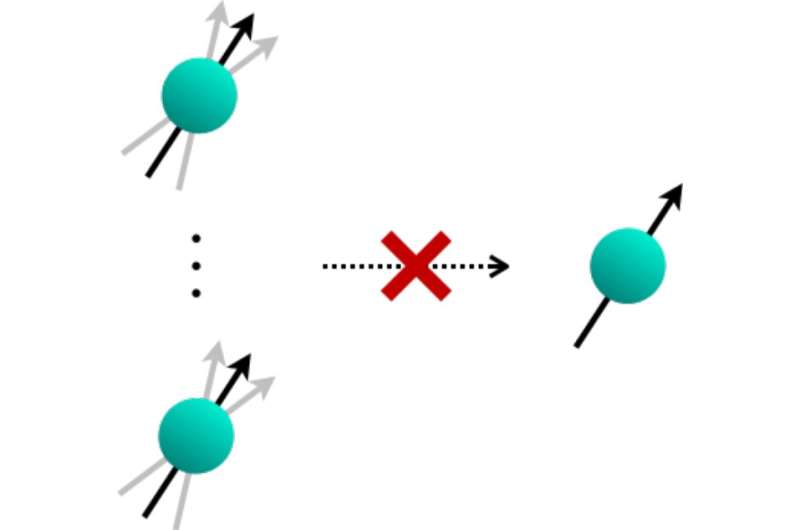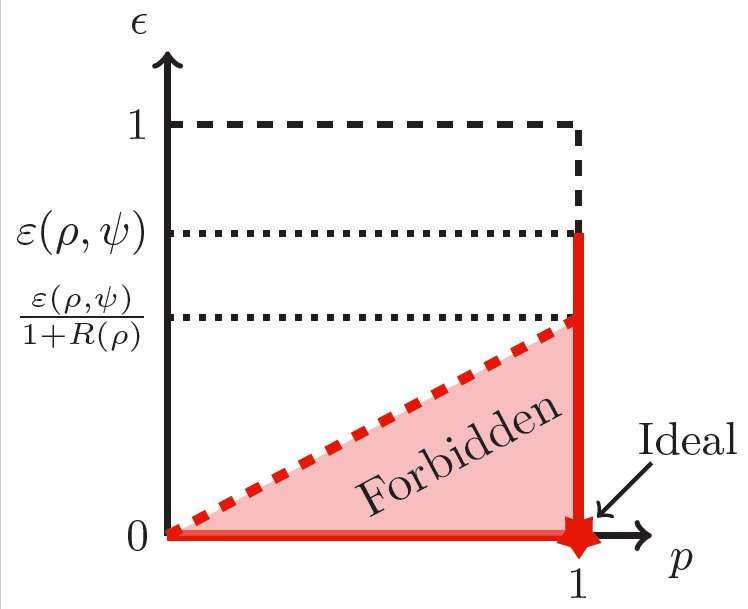A drawing representing distillation---a fundamental subroutine for quantum technologies. Credit: Fang & Liu.
Quantum technologies, such as quantum computers, quantum sensing devices and quantum memory, have often been found to outperform traditional electronics in speed and performance, and could thus soon help humans to tackle a variety of problems more efficiently. Despite their huge potential, most quantum systems are inherently susceptible to errors and noise, which poses a serious challenge to implementing and using them in real-world settings.
To enable the large-scale implementation of quantum technologies, researchers have been trying to develop techniques that could make them more resilient to noise and less prone to errors. While some of these methods, such as quantum error correction and fault tolerance, have proved to be useful and are now cornerstones of quantum information science, the factors that limit the performance of quantum systems in real-world applications are still poorly understood.
Researchers at University of Cambridge in the U.K. and Perimeter Institute for Theoretical Physics in Canada have recently tried to gain a theoretical understanding of the limitations of techniques for "purifying" noisy quantum resources. In a paper published in Physical Review Letters, they mathematically proved the existence of a series of universal limits on the accuracy and efficiency of methods to purify different types of quantum resources associated with practical applications, which play a key role in the functioning of quantum technologies.
"The ideas and techniques discussed in our paper originate from the general 'one-shot quantum resource theory,' which we outlined in one of our earlier PRL papers," Zi-Wen Liu, one of the researchers who carried out the study, told Phys.org. "The key idea is to analyze an information-theoretic quantity called the quantum hypothesis testing relative entropy, which is shown to induce universal limitations on noisy-state to pure-state transformations."
Credit: Fang & Liu.
Using mathematical theorems, Liu and his colleagues proved a series of fundamental limitations on the extent to which generic noisy resources can be purified, which stem from the laws of quantum mechanics. The calculations they carried out apply to virtually all types of quantum resources.
"More explicitly, we derive nontrivial lower bounds on the error of converting any full-rank noisy state to any target pure-resource state by any free protocol (including probabilistic ones)—and find that it is impossible to achieve perfect resource purification, even probabilistically," Liu explained. "In particular, there is a nontrivial tradeoff bound between the success probability and the accuracy of the protocol, which is akin to an 'uncertainty relation.'"
The mathematical theorems introduced by this team of researchers imply the existence of strong limits to the efficiency of distillation, a technique to purify quantum resources that underpins a wide variety of blueprinted quantum technologies. More specifically, these theorems introduce the first explicit lower bounds on the costs of magic state distillation, which is considered to be a leading scheme for realizing scalable and fault-tolerant quantum computation.
"Remarkably, our theorems allowed us to establish the first rigorous understanding of the necessary resource costs of large-scale quantum computing and other quantum technologies," Liu said. "We expect that our results will serve as important guidelines and find wide-ranging applications in practical scenarios. Moreover, we are writing a follow-up work on extending the no-purification theorems to quantum channels, which are directly applicable to important dynamical scenarios like quantum channel simulation and circuit synthesis, to make the theory more complete."
In addition to shedding light on the costs and limitations of quantum technologies, the findings improve the understanding of the fundamental principles of quantum mechanics. Like the celebrated no-go theorems, the no-cloning theorem and the uncertainty principle, the new "no-purification" theorems they have introduced are expected to play critical roles in the scientific and practical development of quantum physics. In the future, they could spark further research into how well these limits can be achieved, ultimately paving the way to more efficient quantum technologies for practical real-world applications.
More information: Kun Fang et al. No-Go Theorems for Quantum Resource Purification, Physical Review Letters (2020). DOI: 10.1103/PhysRevLett.125.060405
Zi-Wen Liu et al. One-Shot Operational Quantum Resource Theory, Physical Review Letters (2019). DOI: 10.1103/PhysRevLett.123.020401
Journal information: Physical Review Letters
© 2020 Science X Network

























